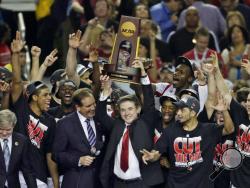NEW YORK (AP) — A once-obscure admitted con man named Louis Martin "Marty" Blazer III may have failed in his scheme to make low-budget movies with money swiped from pro athletes, but he's now succeeded in stealing part of the spotlight in a scandal that's shaken college basketball to its core.
Federal authorities revealed this week that Blazer was the wily informant — referred to in criminal complaints only as CW-1 "cooperating witness-1" — who played a central role in a federal bribery investigation of assistant coaches at four top-tier basketball schools.
"I'm aware of people who are willing to do this," federal prosecutors say Blazer told authorities in 2014 when he agreed to wear a wire and buddy up to coaches who took covert payments in exchange for encouraging top-flight NBA prospects to choose a particular school, agent or financial adviser.
Blazer, 46, posed as an experienced — and corrupt — financial adviser and business manager while helping the FBI make hundreds of recordings — a ruse resulting in a case charging 10 people, including coaches from Auburn, Southern California, Arizona and Oklahoma State.
The expanding ramifications of the probe were felt Wednesday when Louisville announced it was putting basketball coach Rick Pitino on unpaid leave in response to a related scheme alleging agents promised the family of a Louisville prospect it would get $100,000 from Adidas if he signed with the Adidas-sponsored school.
Authorities have declined to discuss their arrangement with Blazer in detail. And there was no immediate response to messages left on Wednesday seeking comment from his lawyer.
But a guilty plea to securities fraud and other charges that could buy him leniency shows that his cooperation played off of a pattern of deception dating to 2000, when prosecutors say he began paying college athletes to get them to retain his company as a financial adviser or business manager.
In that case, Blazer expanded his fraudulent portfolio using a Pittsburgh-based firm, Blazer Capital, that he billed as a "concierge" financial advisory firm that catered to the needs of the professional athletes, entertainers and other rich people, according to a Securities and Exchange Commission filing. Instead of helping them, he repeatedly dipped into his client's accounts between October 2010 and January 2013 to fund movies and other ventures.
An SEC lawsuit accused Blazer of bilking five clients of $2.35 million, in part to invest in two films: "Mafia the Movie" and "A Resurrection," a horror movie which was filmed in Pittsburgh and released in 2013. Authorities said Blazer took an interest in the movies after meeting an actor and producer in 2009.
When a former pro athlete client of Blazer refused to back his investments, Blazer took $550,000 from the athlete's account and invested it in the movie projects, forging documents to make it appear the transfers were sanctioned, the SEC said.
The client found out and threatened to sue, causing Blazer to return the money by draining another client's account, the SEC said. He then took an extra $100,000 from the second client — a current professional athlete — to fund a project by a country music management company, it said in its 2016 filing.
The Ponzi scheme unraveled in 2013 when the SEC contacted the athlete, who notified the agency that he had never authorized transfers from his accounts or an investment in the music venture. At the time, Blazer had moved the majority of clients he advised to a firm that had 21 clients and about $15 million in assets under management, the SEC said.
Last month, the SEC announced a financial judgment requiring Blazer to disgorge $1.8 million plus interest and pay a $150,000 civil penalty, while agreeing never again to work in the industry.
Blazer's reputation was further muddied through some legal skirmishes.
The Pittsburgh Tribune-Review reported in May 2016 that retired NFL running back Kevan Barlow filed a complaint against Blazer with the Financial Industry Regulatory Authority, or FINRA, in 2011, seeking $4 million in compensatory and $12 million in punitive damages. The case settled in 2012. A message left with Barlow's lawyer was not immediately returned. The Tribune-Review also reported that a New Jersey-based bank sued Blazer in 2013 and 2014 for a series of unpaid loans he had signed as a guarantee on behalf of a former college basketball player and two former NFL players.
After switching sides, Blazer's work as a cooperator in the basketball case included recording and videotaping a meeting with former NBA star and Auburn assistant Chuck Person and others in late 2016 at a restaurant near the university in which Person agreed to accept $50,000 in bribes to steer college athletes to his firm, court papers said. The documents describe how a few weeks later, the pair exchanged chummy text messages about whether Person was being wired $5,000 or $10,000 as an installment.
"I thought it was 10. I guess 5 will do," Person said.
"Nah 5 + the 5 from yesterday right!" the cooperator reassured him. "No prob!"
As the payments from Blazer rolled in, Person bragged in a recorded exchange about how their illicit deal was a win-win, according to the papers.
"I got some great great, I mean great great ball players," the coach said. "I'd like to get these players to you and then, if I can supplement myself, that'll be good for both of us."

